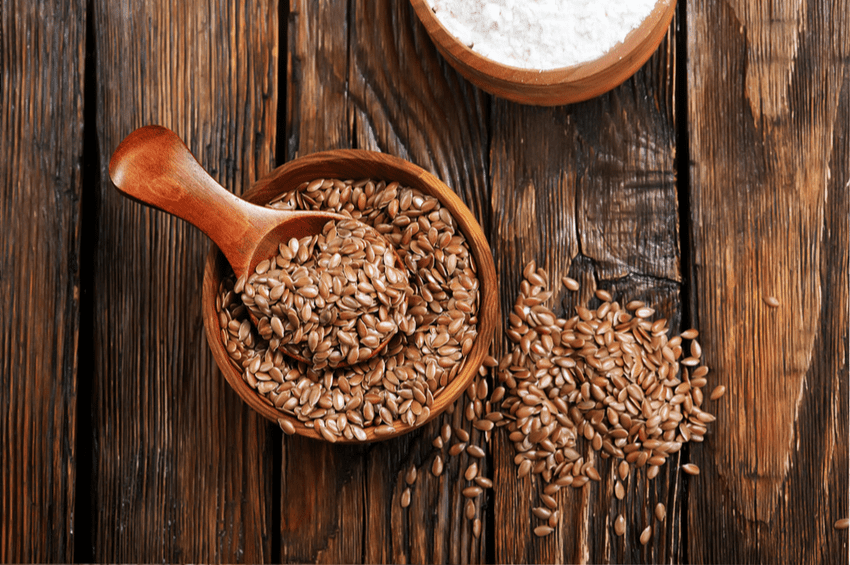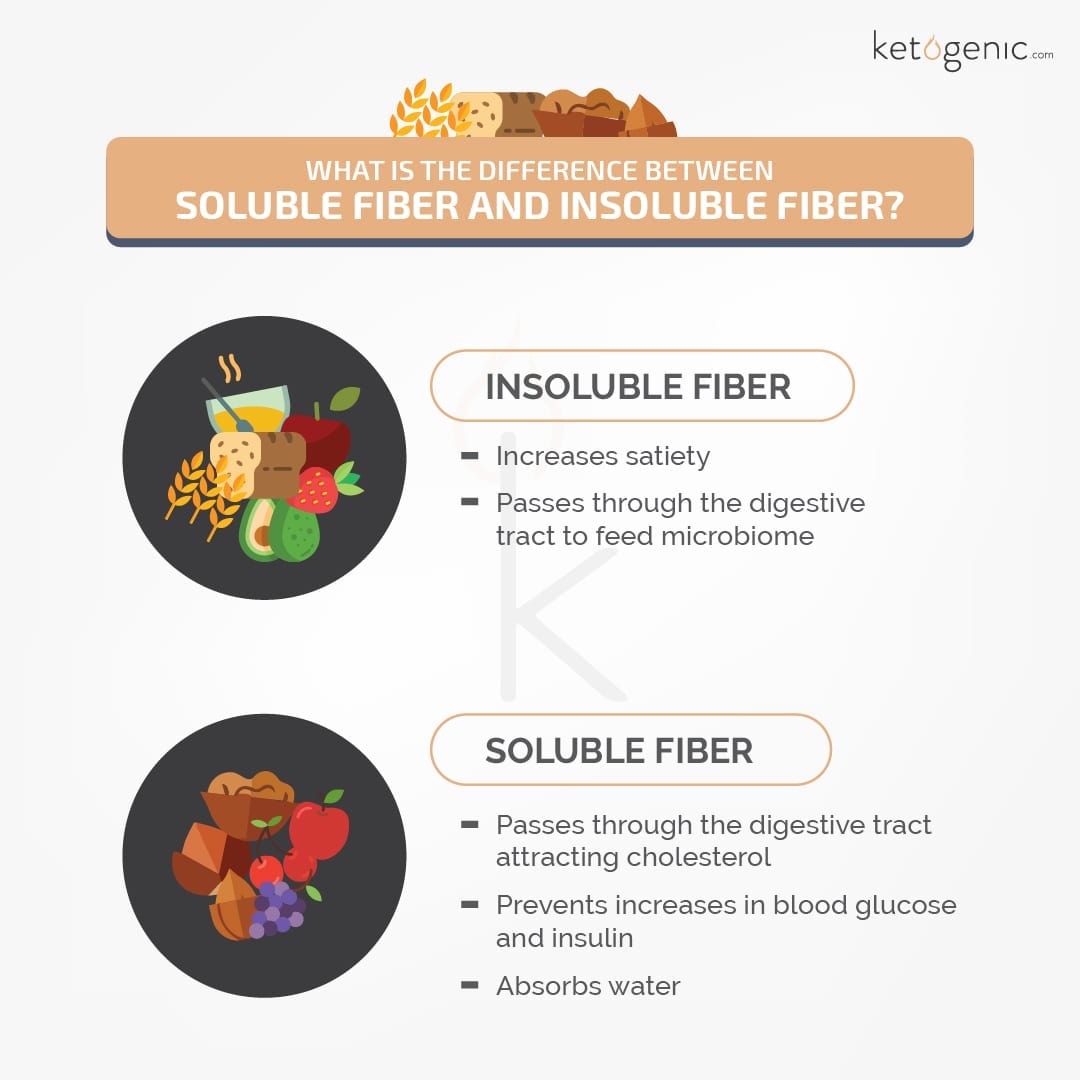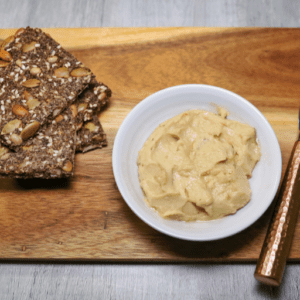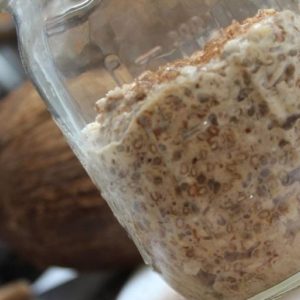
Flax seeds are popular among those following a paleo, vegetarian, or ketogenic diet! Let’s discuss the top ten health benefits of flax seed and the best ways to incorporate them into your ketogenic diet.
1.) Nutrient-Rich
Flaxseeds come in two main types: brown and golden. 1 Tablespoon (about 7 grams) of flaxseeds contains 1.3 grams of protein, 1.9 grams of fiber, and 1,597mg of omega-3s! You can also get 8% of the RDI for vitamin B1, 7% of the RDI for magnesium, and 4% of the RDI for phosphorous.
2.) Fiber
The health benefits of fiber are no secret, and flax seeds contain two types of dietary fiber: soluble and insoluble. You can obtain 3 grams of fiber in just one tablespoon of flaxseeds, which is an estimated 8-12% of the RDI for men and women.
Bacteria in the large bowel ferment the fiber in flaxseeds and improves bowel movement regularity. Fiber is also useful for improving irritable bowel syndrome and preventing constipation. [2]

3.) Cholesterol
You might not know that flaxseeds can lower cholesterol levels. Research shows people with high cholesterol who consumed 3 tablespoons of flaxseed powder every day for three months experienced a reduction of ‘bad’ LDL cholesterol by almost 20% and total cholesterol by 17%. [3]
One study examined people with diabetes who consumed 1 tablespoon of flaxseed powder every day for one month. The study revealed a 12% increase in ‘good’ HDL cholesterol. [4]
These effects might be a result of the fiber in flaxseeds binding to bile salts before being excreted from the body. Cholesterol is pulled from your blood into your liver to replenish these bile salts, which lowers your blood levels of cholesterol. [5]
4.) Omega-3s & Heart Health
You’ve heard all the fuss about omega-3s! If you don’t eat fish or you’re a vegetarian, flaxseeds are a good source of the omega-3 alpha-linolenic acid (ALA) – the plant-based omega-3 fatty acid.
ALA is an essential fatty acid you must obtain from your food because your body doesn’t produce them. The studies on the health advantages of ALA are impressive. For example, one study of 3,638 people revealed those who consumed more ALA had a lower risk of heart attack compared to those who consumed less ALA.
A review of 27 studies involving over 250,000 people showed ALA may help reduce the risk of heart disease by 14%. Flaxseed oil has a higher content of ALA compared to flaxseeds. [6] [7]

5.) Plant-Based Protein
Flaxseeds are a popular source of high-quality plant-based protein. Flaxseed protein has an abundance of amino acids: glutamic acid, aspartic acid, and arginine. [8] [9]
Lab and animal studies show flaxseed protein had antifungal properties, helped prevent tumors, lowered cholesterol, and improved immune function. [10] [11] [12]
6.) Cancer Risk
Compared to other plant foods, flaxseeds have up to 800 times more lignans. Lignans are antioxidant plant compounds with estrogenic properties that have been shown to improve health and lower the risk of cancer. [13]
One study involving over 6,000 women concluded those who eat flaxseeds are 18% less likely to get breast cancer. More research is needed specifically on lignans in flaxseeds and cancer risk. [14]
7.) Blood Pressure
Studies show flaxseeds have a natural ability to lower blood pressure. One study found ingesting 30 grams of flaxseeds every day for six months lowered diastolic and systolic blood pressure by 7 mmHg and 10 mmHg. [15]
A large review of multiple studies concluded taking flaxseeds every day for over three months decreased blood pressure by 2 mmHg. Lower blood pressure could decrease the risk of fatality from a stroke or heart disease. [16] [17]
8.) Blood Sugar
High blood sugar levels are usually the result of the body’s resistance to insulin or the inability to produce insulin. When people with type 2 diabetes included 10-20 grams of flaxseed powder in their diet every day for at least one month, they experienced 8-20% decrease in blood sugar levels. [18] [19] [20]
The blood sugar-lowering effect might be due to flaxseeds’ insoluble fiber content. Insoluble fiber slows down the release of sugar into the blood, which reduces blood sugar. [21]
9.) Satiety
If you’re a sneaky snacker on your keto diet, you might want to consider adding flaxseeds to your meals or beverages to ward off hunger pangs. One study revealed adding 2.5 grams of flax fiber to a drink decreased feelings of hunger and appetite. [22]
Flaxseeds might boost satiety due to the soluble fiber content. Soluble fiber slows digestion in the stomach and triggers hormones that control appetite and make you feel full. [23] [24]
Suppressing hunger and increasing feelings of fullness could be helpful for weight control.
10.) Versatility
You can add versatile flaxseeds or flaxseed oil to a range of common ketogenic foods, for example:
- Dress your salad with flaxseed oil
- Add flaxseeds to your water or smoothie and drink it
- Add flaxseeds to water as an egg substitute
- Mix flaxseeds into a keto yogurt
- Bake them into delicious keto baked goods
- Sprinkle a tablespoon of ground flaxseed over your cold or hot keto breakfast cereal
Flaxseed Tips and Recipes
So now that you know all of the benefits of flax seed, you might be wondering how to incorporate more into your diet. Here are some helpful tips and recipes!
Flaxseed oil is typically extracted by cold pressing, and the oil is sensitive to light and heat. It’s best to keep your flaxseed oil in dark glass bottles and store it in a dark, cool place like your kitchen pantry or cabinet. Flaxseed oil isn’t suitable for cooking at higher temperatures, but there are other keto-friendly oils available.
Add more flaxseeds to your diet with these tempting keto recipes:










References
Slavin, J. L. (2008). Position of the American Dietetic Association: Health implications of dietary fiber. J Am Diet Assoc, 108(10), 1716-31. DOI: 10.1016/j.jada.2008.08.007
Kajla, P., Sharma, A., & Sood, D. R. (2015). Flaxseed: A potential functional food source. J Food Sci Technol, 52(4), 1857-1871. DOI: 10.1007/s13197-014-1293-y
Saxena, S., & Katare, C. (2014). Evaluation of flaxseed formulation as a potential therapeutic agent in mitigation of dyslipidemia. Biomed J, 37(6), 386-90. DOI: 10.4103/2319-4170.126447
Mani, U. V., Mani, I., Biswas, M., & Kumar, S. N. (2011). An open-label study on the effect of flax seed powder (linum usitatissimum) supplementation in the management of diabetes mellitus. J Diet Suppl, 8(3), 257-65. DOI: 10.3109/19390211.2011.593615
Kristensen, M., Jensen, M. G., Aarestrup, J., Petersen, K., Sondergaard, L., Mikkelsen, M. S., & Astrup, A. (2012). Flaxseed dietary fibers lower cholesterol and increase fecal fat excretion, but magnitude of effect depend on food type. Nutr Metab (Lond), DOI: 10.1186/1743-7075-9-8
Campos, H., Baylin, A., & Willett, W. C. (2008). Alpha-linolenic acid and risk of nonfatal acute myocardial infarction. Circulation, 118(4), 339-45. DOI: 10.1161/CIRCULATIONAHA.107.762419
Pan, A., Chen, M., Chowdhury, R., Wu, J. H. Y., Sun, Q., Campos, H., Mozaffarian, D., & Hu, F. B. (2012). α-Linolenic acid and risk of cardiovascular disease: A systematic review and meta-analysis. Am J Clinical Nutrition, 96(6), 1262-73. DOI: 10.3945/ajcn.112.044040
Reaney, J. T. (2014). Flaxseed (Linum usitatissimum L.) bioactive compounds and peptide nomenclature: A review. Trends in Food Science & Technology, 38(1), 5-20.
Chung, M. W. Y., Lei, B., & Li-Chan, E. C. Y. (2005). Isolation and structural characterization of the major protein fraction from NorMan flaxseed (Linum usitatissimum L.). Food Chemistry, 90(1-2), 271-279.
Rabetafika, H. N., Remoortel, V., Danthine, S., Paquot, M., & Blecker, C. (2011). Flaxseed proteins: Food uses and health benefits. International Journal of Food Science & Technology, https://doi.org/10.1111/j.1365-2621.2010.02477.x
Udenigwe, C. C., & Aluko, R. E. (2010). Antioxidant and angiotensin converting enzyme-inhibitory properties of a flaxseed protein-derived high fischer ratio peptide mixture. J Agric Food Chem, 58(8), 4762-4768. https://doi.org/10.1021/jf100149w
Xu, Y., Hall 3rd, C., & Wolf-Hall, C. (2008). Antifungal activity stability of flaxseed protein extract using response surface methodology. J Food Sci, 73(1), M9-14. DOI: 10.1111/j.1750-3841.2007.00576.x
McCann, S. E., Wactawski-Wende, J., Kufel, K., Olson, J., Ovando, B., Kadlubar, S. N., Davis, W., Carter, L., Muti, P., Shields, P. G., & Freudenheim, J. L. (2007). Changes in 2-hydroxyestrone and 16alpha-hydroxyestrone metabolism with flaxseed consumption: Modification by COMT and CYP1B1 genotype. Cancer Epidemiol Biomarkers Prev, 16(2), 256-62. DOI: 10.1158/1055-9965.EPI-06-0633
Lowcock, E. C., Cotterchio, M., & Boucher, B. A. (2013). Consumption of flaxseed, a rich source of lignans, is associated with reduced breast cancer risk. Cancer Causes Control, 24(4), 813-6. DOI: 10.1007/s10552-013-0155-7
Rodriguez-Leyva, D., Weighell, W., Edel, A. L., LaVallee, R., Dibrov, E., Pinneker, R., Maddaford, T. G., Ramjiawan, B., Aliani, M., Guzman, R., & Pierce, G. N. (2013). Potent antihypertensive action of dietary flaxseed in hypertensive patients. Hypertension, 62(6), 1081-9. DOI: 10.1161/HYPERTENSIONAHA.113.02094
Khalesi, S., Irwin, C., & Schubert, M. (2015). Flaxseed consumption might reduce blood pressure: A systematic review and meta-analysis of controlled trials. J Nutr, 145(4), 758-65. DOI: 10.3945/jn.114.205302
Lewington, S., Clarke, R., Qizilbash, N., Peto, R., Collins, R., & Prospective Studies Collaboration. (2002). Age-specific relevance of usual blood pressure to vascular mortality: A meta-analysis of individual data for one million adults in 61 prospective studies. Lancet, 360(9349). 1903-13. DOI: 10.1016/s0140-6736(02)11911-8
Mani, U. V., Mani, I., Biswas, M., & Kumar, S. N. (2011). An open-label study on the effect of flax seed powder (Linum usitatissimum) supplementation in the management of diabetes mellitus. J Diet Suppl, 8(3), 257-65. DOI: 10.3109/19390211.2011.593615
Kapoor, S., Sachdeva, R., & Kochhar, A. (2011). Efficacy of flaxseed supplementation on nutrient intake and other lifestyle pattern in menopausal diabetic females. Studies on Ethno-Medicine, DOI:10.1080/09735070.2011.11886403
Nazni, P., Amirthaveni, M., & Vijayakumar, T. P. (2006). Impact of flaxseed based therapeutic food on selected type II diabetic patients. Indian Journal of Nutrition and Dietetics, 43(4), http://www.informaticsjournals.com/index.php/ijnd/article/view/6349
Thakur, G., Mitra, A., Pal, K., & Rousseau, D. (2009). Effect of flaxseed gum on reduction of blood glucose and cholesterol in type 2 diabetic patients. Int J Food Sci Nutr, DOI: 10.1080/09637480903022735
Ibrugger, S., Kristensen, M., Mikkelsen, M. S., & Astrup, A. (2012). Flaxseed dietary fiber supplements for suppression of appetite and food intake. Appetite, 58(2), 490-5. DOI: 10.1016/j.appet.2011.12.024
Wanders, A. J., Van Den Borne, J. J. G. C., De Graaf, C., Hulshof, T., Jonathan, M. C., Kristensen, M., Mars, M., Schols, H. A., & Feskens, E. J. M. (2011). Effects of dietary fibre on subjective appetite, energy intake, and body weight: A systematic review of randomized controlled trials. Obes Rev, 12(9), 724-39. DOI: 10.1111/j.1467-789X.2011.00895.x
Kristensen, M., Savorani, F., Christensen, S., Engelsen, S. B., Bugel, S., Toubro, S., Tetens, I., & Astup, A. (2013). Flaxseed dietary fibers suppress postprandial lipemia and appetite sensation in young men. Nutr Metab Cardiovasc Dis, 23(2), 136-43. DOI: 10.1016/j.numecd.2011.03.004










